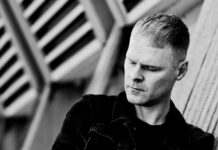
Photo: Press (Krust)
Kirk Thompson a.k.a. Krust needs little introduction. As co-founder of Full Cycle together with Roni Size, member of the Reprazent collective and as a prolific and influential solo artist, the Bristol-born artist has been shaping the dance music scene for about three decades now – and seems to be busier than ever. Following up on the release of The Edge of Everything last year, his first new album in almost one and a half decade, Thompson has released a remix package on Crosstown Rebels featuring artists such as Four Tet, Masters At Work and Hodge. He has also been dedicating a considerable amount of time to his Adapt the Canvas project while exploring the possibilities of the so-called web3. His mix for our Groove podcast is fittingly dedicated to „doing things a little bit differently.“
You have played a few gigs since clubs reopened in the UK. How has the experience been so far?
Everything is basically the same as it was, people enjoying themselves with a sense that we’re free thrown in. It’s been a lot of fun!
In a recent „Baker’s Dozen“ feature for the online magazine The Quietus, you spoke about your twelve favourite records of all times, among them LPs by Public Enemy, Run the Jewels and Kanye West. Aside from their obvious influence on you as a music fan, did these records also have an impact on you as a producer?
Yes, very much. When I listen to music I’m breaking it down, trying to understand what’s happening – what they think the way they do, what makes them do what they do, what their influences are. I try get as much info about the studio, equipment, mindset, story. I want to break it down into all its components and meditate on that for a few months and see how it affects me, where it takes me, what doors it opens up. Then when I go on my quest, I see what insights come from it.
The list interestingly did not feature any dance music albums, at least not in the strict sense of the term. You yourself however have released The Edge of Everything, your first album in 14 years, just last year. What significance does the album format have for you in the context of club music, and what made you return to the format after such a long time?
I don’t really think about music like that, I write how it comes out. I like the energy of dance music but the format for me doesn’t push the possibility of what could be. With my music, I’m exploring the outer realms of the edge. Sometimes I fall off, some times it’s a work in progress, with The Edge of Everything it’s opening a doorway to where I’m heading next. Deeper into what’s out there – technology, spirituality, psychedelics, the metaverse.
For a recently released remix package, you enlisted your brother Flynn and Masters At Work, but also younger artists like LCY, Hodge and Batu. How do you perceive the new generation of UK-based producers generally, what kind of developments have you witnessed that excite you? And what makes those three special in your eyes and ears?
They are the rebels, the new disrupters, the troublemakers. These are my type of people. They’re using technology in new and exciting ways. Creating new sound palettes, arrangements. Fearless. I’m a student right now so I’m open to the level of experimentation they expose me to.
Speaking of the new generation, you have been acting as a mentor for years now and during the pandemic also started the video series Adapt the Canvas. Why is it of such important to you to share your knowledge with others and how do you go about programming the series?
Thank you for the question. Adapt the Canvas may be my most important work. The music is for people who want to listen and are lead to hearing it. Sometimes this can be limiting and it can also be dismissed as „just music.“ Adapt the Canvas is breaking down the deeper side of the artist experience. What we all have, use, but have little understanding of. Mindset. The difference that makes the difference is how we think. What separates the top 5% from everyone else is what they think, what they believe and how they see themselves, their self-image. Not many people are having this conversation. 20 or so years ago Ihad what most would say was a breakdown but in actuality was a breakthrough. The old self wasn’t equipped for what was next. As evolving beings there was no and there is no real practice for creators to learn mental models, linguistic patterns, belief systems and performance psychology. You might ask, „why do we need to learn this?“ Very simple: the problem is progress! We don’t have the skills to keep up with the changes to the environment, technology is outpacing human understanding at an alarming rate. And if that’s true, what’s next? Most people can’t understand the concept let alone answer the question. So Adapt the Canvas seeks to play a role in bridging the gap.
In one episode, you also speak about the so-called web3 – blockchain-based technologies like NFTs or new organisational forms like DAOs. What potential do you see in them for independent artists?
Web3 could be the a huge breakthrough for indie artists. Web 2.0 was about the platforms and the gatekeepers. We want more control over how we interact with our communities. Web3 provides a clear and direct line to our community with a way to monetise our work without giving it away to platforms. The next wave will be about how creators build a new network that they can benefit from. Blockchains create security and ownership, DAOs help communities invest in artists. NFTs are a lot of things, like a membership token or access to group, and not just a piece of art. I think were just seeing the start of something DIY, anarchistic, punk, revolutionary – but in favour of the artist.
What was the idea behind your mix for our Groove podcast?
This mix is about doing things a bit differently.
Last but not least: What are your plans for the future?
Building Adapt the Canvas, exploring Web3 and creating an agency around it, plus lots of new music and other exciting content coming soon.
Stream: Krust – Groove Podcast 315
01. Cloud Lord – Wet Whistle
02. Mark System – The Earth
03. Krust – Negative Returns
03. Solsan – Midnight Black
04. Air – Breathless
05. Oli Lewis – Slow Burn
06. Die – Clear Skyz VIP
07. Mark System – Course of Action
08. Krust – Tree of Life
09. Krust – Hegel Dialectic
10. Oli Lewis – Only Luv You
11. SG – Offset
12. Jubei – Barracuda
13. Nami – Correr
14. Oil Lewis – Sea Salt
15. Missing Trex – 2 Infinity
16. SG – Bitter
17. Mechanizm – Mystic VIP
18. Fanu & Infader – Truth and Lies
19. Oil Lewis – Bile Driver
20. Damage Report – Chaaa
21. Oil Lewis – This Ain’t Over




